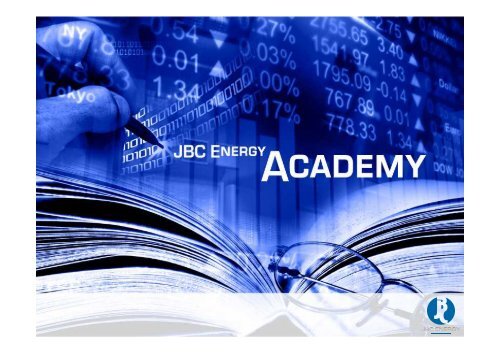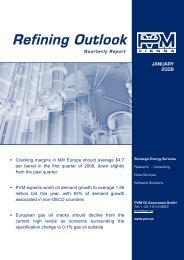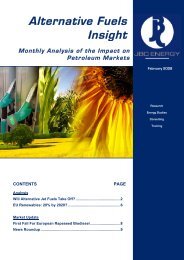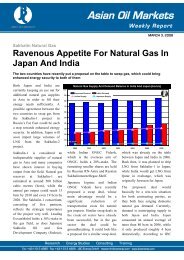JBC Energy Academy Brochure
JBC Energy Academy Brochure
JBC Energy Academy Brochure
You also want an ePaper? Increase the reach of your titles
YUMPU automatically turns print PDFs into web optimized ePapers that Google loves.
History and Background<br />
Content Overview<br />
Modules<br />
Contact & Booking Info<br />
Overview of this Guide<br />
<strong>Academy</strong> Programme 2
Since its establishment in 1994 the goal of the <strong>JBC</strong> <strong>Energy</strong><br />
<strong>Academy</strong> Training Programme has been to provide participants<br />
with the knowledge and skills they need to perform in an everchanging<br />
environment.<br />
As we conduct our workshops on a single-company basis, we<br />
can ensure maximum flexibility and absolute confidentiality.<br />
Hands-on experience and up-to-date content guarantee that our<br />
range of courses will meet the requirements of all of your<br />
employees.<br />
Our modules can be combined in numerous ways according to<br />
client requirements, while the depth of coverage can be<br />
adjusted to the skill level of each individual group.<br />
History & Background<br />
<strong>Academy</strong> Programme 3
Our workshops are held at our training<br />
centre in the heart of historical Vienna, an<br />
elegant and vibrant city. Wien, as it is<br />
known to the locals, boasts beautiful<br />
architecture, excellent hotels as well as a<br />
warm Austrian welcome.<br />
As a part of the course, we are happy to<br />
arrange some of the many cultural<br />
events/experiences that Vienna has to<br />
offer. <strong>JBC</strong> <strong>Energy</strong> can also assist with<br />
reservations for airport transportation<br />
and accommodation on request.<br />
History & Background<br />
Venue<br />
<strong>Academy</strong> Programme 4
History & Background<br />
Faculty<br />
<strong>JBC</strong> <strong>Energy</strong> <strong>Academy</strong> facilitators are<br />
experienced market participants,<br />
researchers and analysts who work with<br />
all aspects of international oil markets<br />
on a daily basis. This allows our clients to<br />
benefit from a wealth of up-to-date<br />
knowledge.<br />
With each <strong>JBC</strong> <strong>Energy</strong> <strong>Academy</strong> course<br />
catering for 3 to 5 participants, <strong>JBC</strong><br />
<strong>Energy</strong> offers an excellent trainer to<br />
participant ratio. As a result, we ensure<br />
that all attendees’ questions are<br />
addressed and that optimal<br />
understanding takes place.<br />
<strong>Academy</strong> Programme 5
Basic Basic Modules<br />
Modules<br />
Risk Management Modules Oil Fundamentals<br />
OTC Markets & Exchanges<br />
Basic Instruments<br />
Advanced Instruments<br />
Applied Hedging Examples<br />
Crude & Product Pricing<br />
Shipping Issues & FFAs<br />
Risk Managment Organisation<br />
Intermediate Intermediate Modules<br />
Modules<br />
Advanced Advanced Advanced Modules<br />
Modules<br />
Crude Basics & Fundamentals<br />
Opec<br />
Recommended combinations of the above modules can be found in the last section of this brochure<br />
Structure of the Modules<br />
Commercial & Strategic Inventories<br />
Global Supply & Demand Issues<br />
Regional Analysis<br />
Market Watch Presentation<br />
Refining Basics & Economics<br />
Refined Product Fundamentals<br />
Alternative Fuels<br />
Long-Term S&D, Price Forecasting<br />
<strong>Academy</strong> Programme 6
Risk Management & Paper Market Modules<br />
<strong>Academy</strong> Programme 7
OTC Markets & Exchanges<br />
This workshop gives a profound insight into energy trading on exchanges and OTC markets.<br />
Participants will become familiar with the principles of forward and futures trading. Practical<br />
examples at the end of the workshop will enforce the understanding of theoretical concepts.<br />
During the course attendees will:<br />
• Understand the characteristics of futures and forwards<br />
• Gain insight into prices: settlement, BWAVE; FrontLine<br />
• Investigate the role of the clearinghouse<br />
Paper Market Modules<br />
<strong>Academy</strong> Programme 8
Basic Instruments<br />
During the course attendees will:<br />
• Investigate the development of ICE Brent futures out of the Brent<br />
Forward contract<br />
• Learn what swaps are and how they work<br />
• Gain a basic understanding of options<br />
• Practise the application of basic derivative instruments<br />
Paper Market Modules<br />
This module focuses on the basic derivative instruments of trading in the „paper market“.<br />
Participants will investigate the principles behind swaps, options and futures as well as how they can<br />
be used for hedging purposes.<br />
<strong>Academy</strong> Programme 9
Advanced Instruments<br />
During the course attendees will gain insight into:<br />
• Contracts for Difference (CFDs)<br />
• Dated to FrontLine (DFLs)<br />
• Exchange of Futures for Physical (EFPs)<br />
• Exchange of Futures for Swaps (EFS)<br />
Paper Market Modules<br />
This module elaborates further on specialised paper market instruments available for trading and<br />
hedging.<br />
<strong>Academy</strong> Programme 10
Applied Hedging Examples<br />
During the course attendees will:<br />
• Learn how to apply different hedging instruments<br />
• Identify potential risks and rewards of various trading tools<br />
• Understand which instruments are most applicable in each<br />
situation<br />
• Examine the principle of arbitrage trades, eg. Cash & Carry<br />
• Look into hedging of the refinery margin (crack spreads)<br />
• Gain insight into the combination of options (collar)<br />
Risk Management Modules<br />
In this module realistic business cases are discussed, including hedging of crude or products,<br />
as well as cash and carry arbitrage examples.<br />
<strong>Academy</strong> Programme 11
Crude & Product Pricing<br />
Risk Management Modules<br />
How is the price of crude oil and oil products established? This is the main question that will be<br />
answered in this module. During this course participants will gain an understanding of the factors<br />
that are taken into account when setting a price, and what the various procedures are.<br />
During the course attendees will:<br />
• Identify the main sources for prices<br />
• Learn the various calculations used in price formation<br />
• Gain insight into the differing methodologies<br />
used by pricing agencies<br />
• Understand the different types of prices<br />
• Investigate the connections between prices in different markets<br />
<strong>Academy</strong> Programme 12
Shipping Issues & FFAs<br />
Risk Management Modules<br />
This module provides an overview of oil shipping, tankers and freight rates as well as<br />
possibilities to hedge against risk associated with transportation costs.<br />
During the course attendees will cover:<br />
• Tankers<br />
• Freight Rates – Worldscale<br />
• Size and classification of vessels<br />
• Definition of freight forwards<br />
• Use of freight forwards<br />
• Underlying markets:<br />
Baltic Exchange – OTC markets<br />
• Examples of hedging<br />
<strong>Academy</strong> Programme 13
Risk Managment Organisation<br />
Jumping out of an aeroplane at 30,000 feet above the ground may be very exciting, but few people<br />
would be stupid enough to do it wíthout a parachute! In oil markets risk is always an issue and finding a<br />
way of minimising this is essential. This course provides participants with an overview of risk types, and<br />
organisational issues regarding risk managment.<br />
During the course attendees will:<br />
• Identify risk types<br />
• Learn about organisational structure<br />
• Gain insight into VaR<br />
• Gain knowledge of volatilities<br />
Risk Management Modules<br />
<strong>Academy</strong> Programme 14
Oil Fundamental Modules<br />
<strong>Academy</strong> Programme 15
Crude Basics & Fundamentals<br />
This module is designed to provide participants with a basic<br />
knowledege of crude oil and its supply. Topics covered include crude oil<br />
characteristics and their importance to the market.<br />
During the course attendees will:<br />
• Learn about API and sulphurbased valuation<br />
• Understand the differences between heavy & light crudes<br />
• Gain knowledge of NGLs and non-conventional oil<br />
• Investigate investment in new crude streams<br />
• Gain insight into the supply outlook for the coming years<br />
• Review imports and exports by region<br />
Oil Fundamentals<br />
<strong>Academy</strong> Programme 16
Opec<br />
In the crude oil supply equation, it is the production management of the Organisation of Petroleum<br />
Producing Countries that effects the price of crude oil. As this is the case, an understanding of Opec is<br />
essential for anyone working in the petroleum business market.<br />
During the course attendees will:<br />
• Learn about the history and objectives of Opec<br />
• Gain insight into the structure of the organisation<br />
• Understand the group‘s production, pricing and investment policy<br />
• Investigate Opec‘s reserves<br />
Oil Fundamentals<br />
• Gain knowledge of the group‘s price bands and reference basket<br />
• Review relationships within the organisation<br />
<strong>Academy</strong> Programme 17
Commercial & Strategic Inventories<br />
Inventories for crude oil and petroleum products often dominate market talk and can have a significant<br />
impact on the price of oil. In our Commercial and Strategic Inventories module we provide participants<br />
with a understanding of all aspects of stock data and its relationship with international markets.<br />
During the course attendees will:<br />
Oil Fundamentals<br />
Inventories<br />
• Learn how to evaulate inventory data<br />
• Gain insight into sources of key data and its availabilty<br />
• Understand the relationship between inventories & prices<br />
• Investigate the psychological effect stock data has on markets<br />
• Examine minimum operational levels<br />
• Review the importance of strategic inventories<br />
<strong>Academy</strong> Programme 18
Regional Analysis<br />
Each region of the world offers different opportunities and challenges to the oil industry. China and<br />
Russia undoubtedly have a very strong impact on fundamentals. These modules, of approximately one<br />
hour each, provide a concise yet in-depth analysis of developments in these key markets. In addition, we<br />
also offer a course on Turkey, which is one of the most actively-developing markets in Europe<br />
During the course attendees will:<br />
• Identify the key supply and demand patterns (crude/products)<br />
• Learn about strategies in developing the hydrocarbon sector<br />
• Gain knowledge on relevant export and import infrastructure<br />
• Gain insight in geopolitical affairs<br />
Oil Fundamentals<br />
Regions<br />
<strong>Academy</strong> Programme 19
Market Watch Presentation<br />
In this module participants are brought up-to-date on all the factors currently influencing international<br />
oil markets it can be described as a concise wrap-up of <strong>JBC</strong> <strong>Energy</strong>‘s fundemantal reasearch<br />
The presentation typically covers:<br />
• Demand<br />
• Supply<br />
• Crude<br />
• Products<br />
• Inventories<br />
• Refining<br />
Oil Fundamentals<br />
<strong>Academy</strong> Programme 20
Global Oil Demand – Facts & Trends<br />
Oil Fundamentals<br />
Oil Demand<br />
Consumption of oil influences the world more than any other commodity, having been the basis of<br />
economic development in western nations. But will this relationship hold in the future? What is oil<br />
actually used for, and how will consumption (growth) patterns change?<br />
During the course attendees will:<br />
• Review historical oil demand developments<br />
• Discuss current & likely future trends<br />
• learn about Split Oil Demand by region, product, sector/use & economy<br />
• Gain an understanding of oil demand statistics<br />
• Compare oil demand forecasts and their underlying assumptions<br />
• Contrast top-down and bottom-up approaches<br />
<strong>Academy</strong> Programme 21
Global Oil Supply – Facts & Trends<br />
Just how much oil is there? How long will it last? What is included in oil supply apart from crude oil?<br />
These are just two of the questions that will be answered during this module. In this exciting course<br />
participants cover all of the issues that surround global supply and demand.<br />
During the course attendees will:<br />
• Investigate global reserve figures<br />
• Identify the key factors that influence global crude supply<br />
• Learn about Opec & non-Opec supply<br />
• Gain insight into the world oil balance<br />
• learn to understand regional supply issues<br />
• Gain knowledge of natural gas & LNG supply<br />
• Review the political risks concerning supply<br />
• Examine the future expansion plans of NOCs and IOCs<br />
• Assess current and future technology<br />
• Discuss investment costs<br />
Oil Fundamentals<br />
Oil Supply<br />
<strong>Academy</strong> Programme 22
Refining Basics & Economics<br />
Believe us, you don’t need an engineering degree to understand the fundamentals of petroleum<br />
refining! This stimulating programme is designed to introduce non-technical oil industry members to<br />
the fascinating field of petroleum refining. Participants will learn how a refinery works and how refinery<br />
operations interact with oil prices and supply/demand balances.<br />
During the course attendees will:<br />
Oil Fundamentals<br />
Refining<br />
• Learn about typical refining set-ups and processes<br />
• Investigate refinery units and their suitability for different products<br />
• Discuss current challenges in the refining sector<br />
• Examine refinery margin calculations and their limitations<br />
• Understand the impact of changing product quantity & quality<br />
• Review refinery expansion and construction projects<br />
<strong>Academy</strong> Programme 23
Refined Product Fundamentals<br />
Oil Fundamentals<br />
Refined Products<br />
This comprehensive module provides an in-depth look at refined products, including naphtha, gasoline,<br />
jet/kero, gas oil/diesel and fuel oil. Backed by <strong>JBC</strong> <strong>Energy</strong>‘s SuDeP TM model, supply/demand<br />
developments as well as trade flows in the past, present and future will be analysed.<br />
During the course attendees will:<br />
• Define different products and learn about their applications<br />
• Investigate recent and future specification changes<br />
• Understand the relationship between different products<br />
• Identify current trends, their reasons and implications<br />
• Detect main consumers and producers of refined products<br />
• Examine product imports, exports and trade flows<br />
<strong>Academy</strong> Programme 24
Alternative Fuels<br />
During the course attendees will:<br />
Oil Fundamentals<br />
Alternative Fuels<br />
Many newspaper inches have been devoted to the subject of alternative<br />
fuels in the recent past, but true insight into supply/demand prospects and<br />
technological process is rare. In this eye-opening module participants will be<br />
given a broad overview of the alternatives to petroleum, with a main focus<br />
on biofuels.<br />
• Examine the different alternative fuels available<br />
• Identify the pro‘s and con‘s of alternative fuels<br />
• Learn about 1 st & 2 nd generation biofuels, plus BTL, GTL and CTL technologies<br />
• Gain an understand the factors that drive alternative fuel demand<br />
• Investigate the cost of producing alternative fuels<br />
• Review the outlook for alternative fuels in the coming years<br />
• Analyse the impact of alternative fuels on the oil sector<br />
<strong>Academy</strong> Programme 25
Long-Term S&D, Price Forecasting<br />
Determining just how much we will be paying for a barrel of oil in the future is not a simple task, but it<br />
is an interesting one. Many quantitative and qualitative factors must be taken into account, starting<br />
with a broad range of fundamentals and ranging to market psychology, policies and politics. In this<br />
module, <strong>JBC</strong> <strong>Energy</strong> will unveil some of its methods.<br />
During the course attendees will:<br />
• Review main oil market fundamentals<br />
(basic academy modules)<br />
• Identify primary non-quantitative factors<br />
• Analyse historical determinants of prices<br />
• Appraise standard concepts of forecasts<br />
• Collate a multitude of information into one projection<br />
• Compose price forecasts based on differentials<br />
• Integrate short-, mid- and long-term outlooks<br />
Oil Fundamentals<br />
Price Forecasting<br />
<strong>Academy</strong> Programme 26
Recommended <strong>Academy</strong> Structures<br />
<strong>Academy</strong> Programme 27
Recommended Workshop Structure<br />
Overview<br />
Day One<br />
Crude Basics & Fundamentals<br />
Commercial & Strategic Inventories<br />
Global Supply Issues<br />
Day Two<br />
Refining Basics & Economics<br />
Refined Product Fundamentals<br />
Crude & Product Pricing<br />
Oil Fundamentals Focus<br />
Day Five (half day)<br />
Day Three<br />
Alternative Fuels<br />
Global Demand Issues<br />
Regional Analysis<br />
Day Four<br />
OTC Markets & Exchanges<br />
Basic Instruments<br />
<strong>Academy</strong> Programme 28
Recommended Workshop Structure<br />
Introduction<br />
Day One<br />
OTC Markets & Exchanges<br />
Basic Instruments<br />
Day Two<br />
Advanced Instruments<br />
Applied Hedging Examples<br />
Risk Management Focus<br />
Day Three<br />
Crude & Product Pricing<br />
Crude Basics & Fundamentals<br />
Commercial & Strategic Inventories<br />
Day Four<br />
Refining Basics & Economics<br />
Refined Product Fundamentals<br />
Alternative Fuels<br />
<strong>Academy</strong> Programme 29
Recommended Workshop Structure<br />
Introduction<br />
Day One<br />
Crude Basics & Fundamentals<br />
Commercial & Strategic Inventories<br />
Opec & Global Supply Issues<br />
Day Two<br />
Refining Basics & Economics<br />
Refined Product Fundamentals<br />
Oil Fundamentals Only<br />
Day Three<br />
Alternative Fuels<br />
Global Demand Issues<br />
Regional Analysis<br />
Day Four<br />
Crude & Product Pricing<br />
Long-Term S&D, Price Forecasting<br />
Market Watch Presentation<br />
<strong>Academy</strong> Programme 30
Recommended Workshop Structure<br />
Introduction<br />
Day 1<br />
OTC Markets & Exchanges<br />
Basic Instruments (incl. FFAs)<br />
Day Day Day 22<br />
2 2<br />
Advanced Instruments<br />
Applied Hedging Examples<br />
Risk Management Only<br />
Day 3<br />
Crude & Product Pricing<br />
Risk Managment Organisation<br />
<strong>Academy</strong> Programme 31
If you have any further questions about our<br />
<strong>Academy</strong> Programme<br />
or booking a workshop please do not hesitate to contact us<br />
<strong>JBC</strong> <strong>Energy</strong> GmbH<br />
Wollzeile 6-8 . . . 1010 Vienna . Austria<br />
Tel: +43-1-513 49 22 . . Fax: +43-1-513 49 66<br />
ISDN VC: +43-1-513 49 22 66<br />
E-mail: academy@jbcenergy.com<br />
www.jbcenergy.com<br />
Research . <strong>Energy</strong> Studies . Consulting . Training





